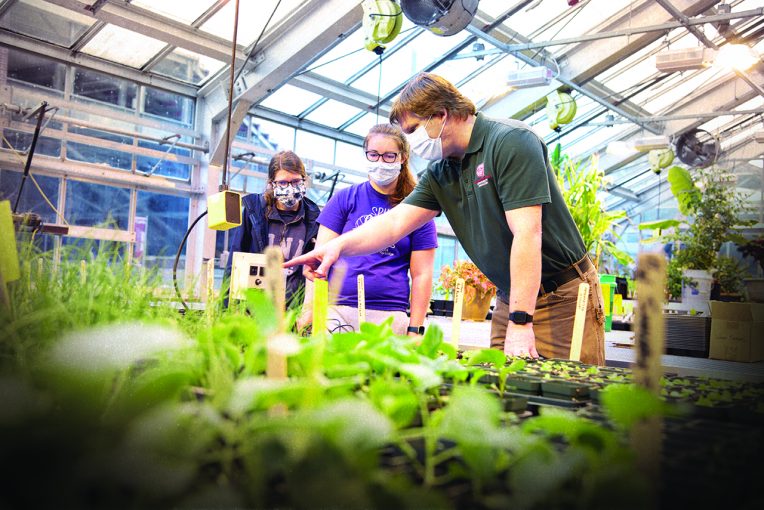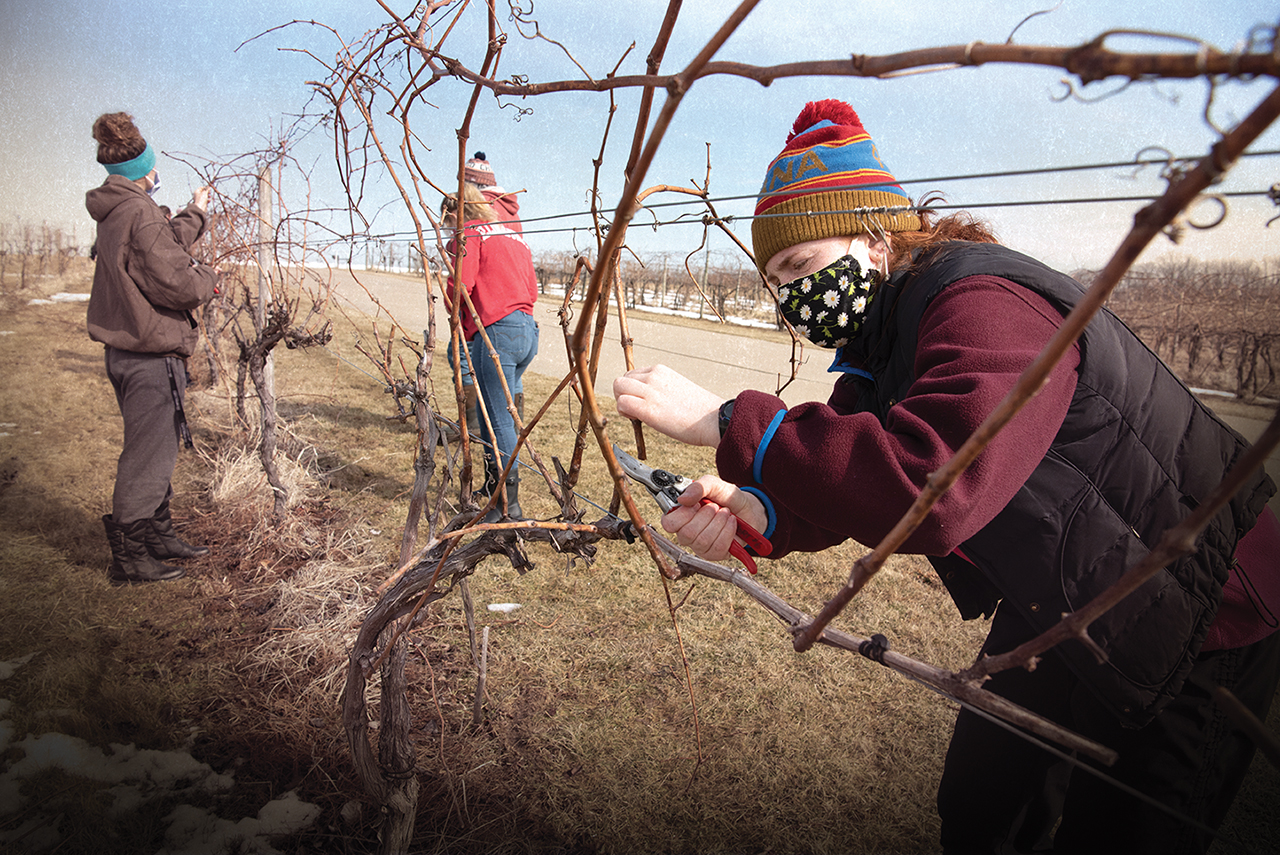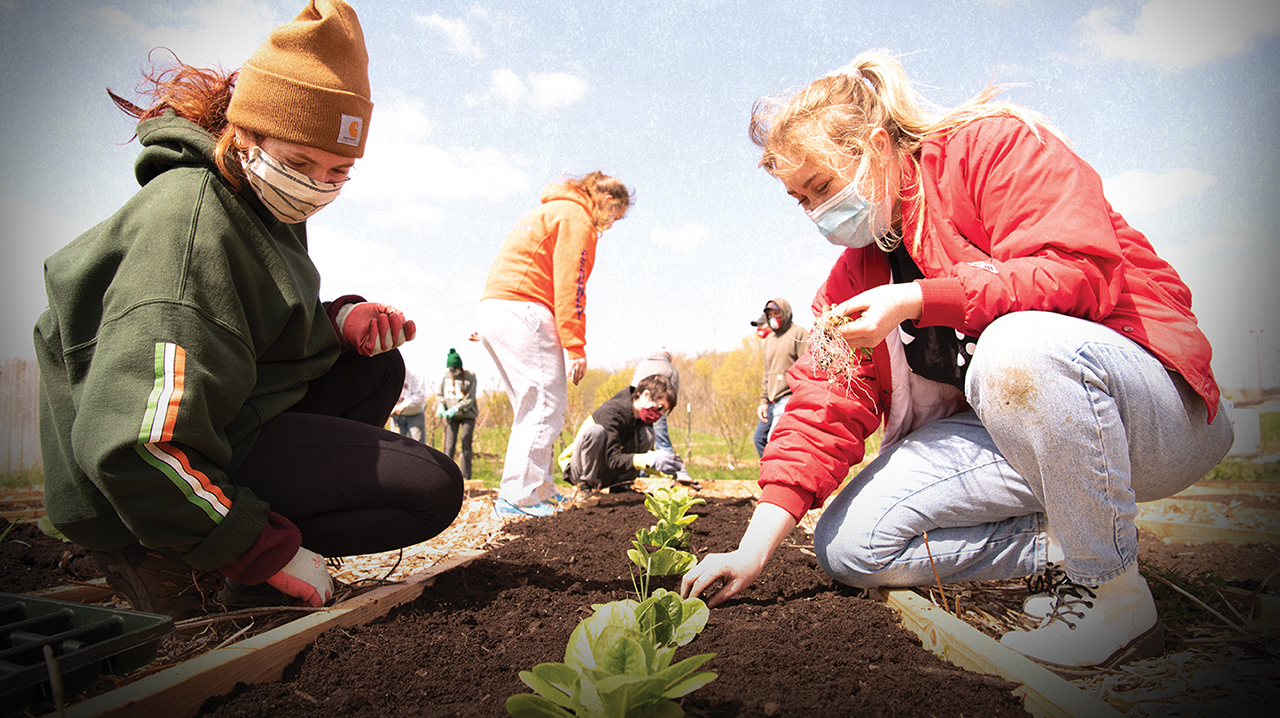Dr. David Kopsell knows his students learn best when they engage with the class content and get their hands dirty. Literally. That’s one reason he constantly looks for ways to provide real-world learning experiences to his horticulture students—experiences that also contribute to the Bloomington-Normal community.
As a professor of horticulture in Illinois State University’s Department of Agriculture, Kopsell has explored multiple ways through the years to get students to learn about and engage with their class material while helping make a local impact.
“I love the fact that as I’m teaching students the principles and practices of horticulture, we’re also helping the local community,” Kopsell said. “I’ve done this my whole career.”
Appears InIn fact, since he began teaching in 2006, Kopsell has incorporated 75 service-learning projects into 50 of his class sections. The projects have involved hardscaping and softscaping (installing plant materials); developing turf management plans; designing home landscapes; and pruning trees, shrubs, and even grapevines. Kopsell’s students have been instrumental in designing and implementing landscaping work around the Ropp Agriculture Building as well as installations at places throughout the community such as Normal Community High School and Ironwood Golf Course.
“Horticulture is very applied,” Kopsell said. “You have to have the skill set to be confident, and then also have an understanding of where you need to go to find the right information. So I like to get my students out of the classroom to show them those things.”
Kopsell’s dedication to service learning was exemplified in his ability to continue to provide rich learning experiences to students amid the coronavirus (COVID-19) pandemic. In spring 2021, his Fruit and Vegetable Production class abided by health and safety guidelines and met in person for lectures and labs. The students toured PrairiErth Farm in Atlanta, Illinois, to see and learn about organic specialty crop production and marketing. They also participated in several service-learning projects that benefited future agriculture students at Illinois State, a family-owned business, and a nonprofit.
After nearly a year spent predominantly in remote learning because of the pandemic, the students were eager to take part in these hands-on experiences. Kopsell’s class size was limited to 11 students to allow for physical distancing, but that restriction did not diminish the students’ drive nor their ability to accomplish many tasks for their community partners.
“(The students) were extremely engaged and totally excited about what they were learning.”
Dr. David Kopsell
“I think for almost all of them, it was their only in-person class this semester,” Kopsell said. “They were extremely engaged and totally excited about what they were learning.”
Senior Matt Nugent, a conservation biology and crop and soil science double major, said remote learning during the pandemic was more difficult for him.
“I liked the hands-on aspect of this course,” he said. “That’s where I learn the best. Last semester with COVID, all of my classes were online, and I feel like I didn’t do as well. So it was nice this semester to be able to get outside and do in-person projects for this course.”
One of the first projects that the students tackled at the start of the semester was assembling seven new benches to provide more usable space within the departmental greenhouse.
“We received funding to purchase rolling benches for the Ropp Greenhouse,” Kopsell explained. “Our greenhouse is very small, so these rolling benches reduce the wasted aisle space and increase the bench top growing surface area. My calculations are that we increased our usable growing space by at least 30%.”
The project also provided valuable, hands-on experience with horticulture equipment for the students. During course lab periods, Kopsell walked the students through where the bench supplies were purchased as well as assembly instructions. The students then did all the assembly work.
“If a student gets hired by a company with limited greenhouse space, they might be able to suggest this type of equipment to their employer,” Kopsell said. “They can also explain the benefits and even the cost savings that come with assembling the benches themselves. This project gave them that experience.”
Another project early in the semester introduced the horticulture students to an alternative form of specialty crop agriculture in Illinois. The students traveled to Mackinaw Valley Vineyard, located about 20 miles west of campus, to learn about grapes and wine production. They toured the facility, taking an inside look at a family-owned small business, and also helped prune several rows of grapevines.
This is the 12th year Kopsell has taken students to the vineyard. General Manager Diane Hahn looks forward to the annual visit.
“Whether the student is a city person or a farm person, it’s likely that they’ve never been exposed to a vineyard,” said Hahn. “It is kind of an unusual thing. They can see that this is a business you can do in Illinois, which isn’t a traditional winemaking state.”
Grapevines have to be pruned every winter while the vines are dormant because grapes only fruit on the current season’s growth.
“We don’t really make a dent in the pruning,” Kopsell said. “But we are able to do several rows, and that alleviates some of the work. It also teaches the students that this is what it takes to run a vineyard. You might think, ‘It’s snowing out, it’s 30 degrees, there shouldn’t be anything to do.’ Well, that’s a real busy time in the vineyard because of all the pruning.”
Katherine Robinson, a senior horticulture major, appreciated the experience at the vineyard. “I didn’t know there were vineyards in Central Illinois and that we could
grow grapes and create our own wines here. That was really cool. It also makes you appreciate how much work goes into a vineyard. We were only out there for an hour and did a row or so of pruning. But they just have such a vast property. It’s a lot of work.”
To Hahn, the importance of the visit by Kopsell’s students isn’t their help in the vineyard, but their overall experience while there. “To me, it’s about really encouraging the students and providing an opportunity for them to see something different.”
“Mackinaw Valley Vineyard is part of this community,” Hahn added. “We should do things that are a service to our community.”
A new partnership Kopsell developed this year with Sunnyside Community Garden and Food Forest also expanded the variety of service learning in his Fruit and Vegetable Production course.
While Kopsell had previous contact with Dr. Caleb Phillips, acting president and farm manager for Sunnyside, the partnership truly developed last year when Kopsell volunteered at the garden as part of a work day with Illinois State University’s Student Sustainability Committee. The two began discussing Sunnyside’s lack of greenhouse space and the opportunity that could provide Kopsell’s students.
Ultimately, Phillips provided seeds and Kopsell used endowment funds and course fees to purchase additional flats, pots, and growing medium for the greenhouse. Throughout their lab periods last February and March, Kopsell’s students worked in the Ropp Greenhouse to plant seeds and then tend to the 3,000 seedlings they grew for Sunnyside.
“We’ll take care of seeding and transplanting.”
Dr. David Kopsell
On April 22, the students spent their lab period at Sunnyside, transplanting some of the seedlings they grew in the greenhouse. They also planted 88 fruit trees and seeded six of the garden’s 31 beds with spinach, carrots, and radishes. Rather appropriately, the work day took place on Earth Day.
“The students were here for three hours, but they did the equivalent of about two weeks’ worth of work for me,” Phillips noted.
The students’ work in the Ropp Greenhouse also saved Phillips 200 to 300 hours of work this winter. The impact is even greater considering that Phillips works part time for Sunnyside and is the garden’s only employee.
Instead of focusing on seedlings this winter, Phillips was able to devote time to important infrastructure work needed at the garden, such as building out raised garden beds.
Phillips also started an apprenticeship program at Sunnyside to offer summer employment and job training to local teens.
“I wouldn’t have been able to make all those infrastructure changes that were absolutely necessary if Dave’s class had not done all that seeding and greenhouse work for me,” said Phillips. “I simply don’t have the hours in my life. And our apprenticeship program wouldn’t be happening if Dave hadn’t stepped in and said, ‘We’ll take care of seeding and transplanting.’”
Kopsell and Phillips plan to continue the partnership in the years to come. “It’s mutually beneficial,” said Kopsell. “I always try and look for projects that aren’t just a one-way street. Our partners are helping our students as much as we’re helping them. It’s important to me to find projects that not only teach our students, but also make a difference.”
Both Kopsell and Phillips also hope that the experience the students gained at Sunnyside will stay with them into the future.
“I want the students to understand that they may go out and get really great agricultural jobs,” said Phillips, “but as they go out, they also can join their church or their synagogue or their civic group or their rotary club or be with the Boy Scouts or Girl Scouts. And all of a sudden, they might realize they’ve got these great skills, this knowledge, and this wisdom that they can pass on.”
Michelle Cooney, a junior majoring in agribusiness and agronomy management, echoed that sentiment. “I didn’t necessarily know that this type of garden existed,” she said. “And now we can all take some of this knowledge, and if we don’t have a garden like this back home, we can start one.”
According to Robinson, “Had I not taken this course, I probably wouldn’t have known this garden was here. I probably wouldn’t have known that I could volunteer here. I wish I found it earlier so that I could have gotten more volunteer experience and helped out.”
Kopsell already has several projects lined up for fall 2021, including landscape design options for the Office of Sustainability on campus and developing turfgrass management plans for Westminster Village in Bloomington.
His ultimate goals, however, in all of his service-learning projects remain the same—helping students dig in, apply what they’ve learned, and build skill sets for their future careers, while also helping the larger community. Kopsell is truly planting seeds of civic engagement in his horticulture students.
“I hope the students as they were working on our projects were not only learning but were feeling good about what they were doing,” he said. “Maybe the class was bigger than just what they were learning. It really made a difference in the community.”



